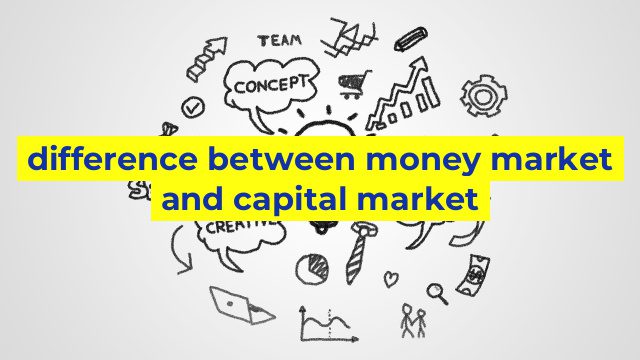Distinguishing the Difference Between Money Market and Capital Market
Investing in the market can seem like a daunting task, especially if you’re a beginner. The various terminologies used in finance can be overwhelming, but knowing the basics can make all the difference. As an investor, it’s essential to understand the differences between money market and capital market.
What is Money Market?
The money market is a segment of the financial market where short-term debt is bought and sold. It is a place where financial institutions such as banks, governments, and corporations can access short-term financing. The money market is so-called because creditworthy borrowers can easily acquire funds at a low-interest rate.
Investors can invest in money market instruments such as treasury bills, certificates of deposit, commercial papers, and repurchase agreements. These investments are attractive because they carry low risk and relatively high liquidity, making them a viable option for individuals seeking low-risk investments.
What is Capital Market?
The capital market is a financial market where long-term securities such as equities, bonds, and derivatives are bought and sold. It is where companies raise capital by issuing debt and selling equity to investors. The capital market comprises the stock market, bond market, and other long-term investments, all of which exist to fund businesses’ growth and expansion.
Investors in the capital market invest in stocks, bonds, mutual funds, and exchange-traded funds. Capital market investments offer a higher potential for reward but come with an increased possibility of loss, higher risk, and less liquidity than money market investments.
Key Differences between Money Market and Capital Market
The following are the key differences between money market and capital market:
– Investment Window: Money market investments are short-term, while capital market investments are long-term.
– Risk and Return: Money market investments come with low risk and a lower potential return, while capital market investments come with a higher potential return but higher risk.
– Securities Traded: Money market investments are limited to short-term instruments, while capital market investments include debt and equity securities.
– Liquidity: Money market investments are more liquid, while capital market investments can be illiquid.
– Participants: The money market primarily consists of banks, financial institutions, and governments, while the capital market involves corporations, investors, and other financial entities.
Conclusion
In conclusion, understanding the difference between money market and capital market is essential for investors seeking to build a diversified portfolio. Each market caters to a specific type of investment, which carries its risks and rewards. Knowing which market suits your investment goals and risk tolerance is crucial for a successful investment journey. As always, consult with your financial advisor before making any investment decisions.
Table difference between money market and capital market
| Money Market | Capital Market |
|---|---|
| The money market refers to a marketplace where short-term financial products are traded. | The capital market refers to a marketplace where long-term financial products are traded. |
| Financial instruments traded in the money market include Treasury bills, certificates of deposit, and commercial paper. | Financial instruments traded in the capital market include stocks, bonds, and derivatives. |
| The maturity period of financial instruments traded in the money market is usually less than a year. | The maturity period of financial instruments traded in the capital market is typically more than a year. |
| The money market is used by governments, central banks, and corporations to manage short-term liquidity needs. | The capital market is used to raise long-term capital for businesses and governments. |
| The money market is less volatile than the capital market. | The capital market is more volatile than the money market. |


